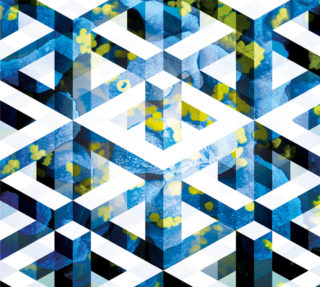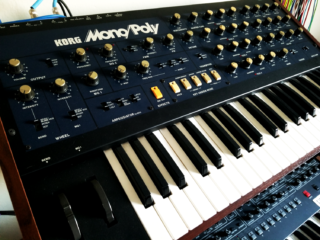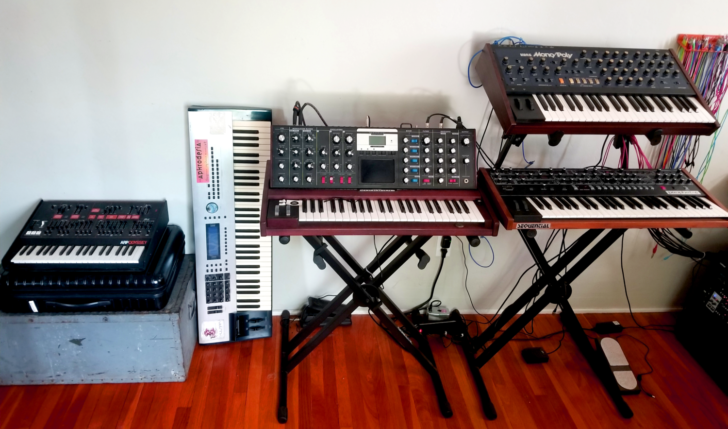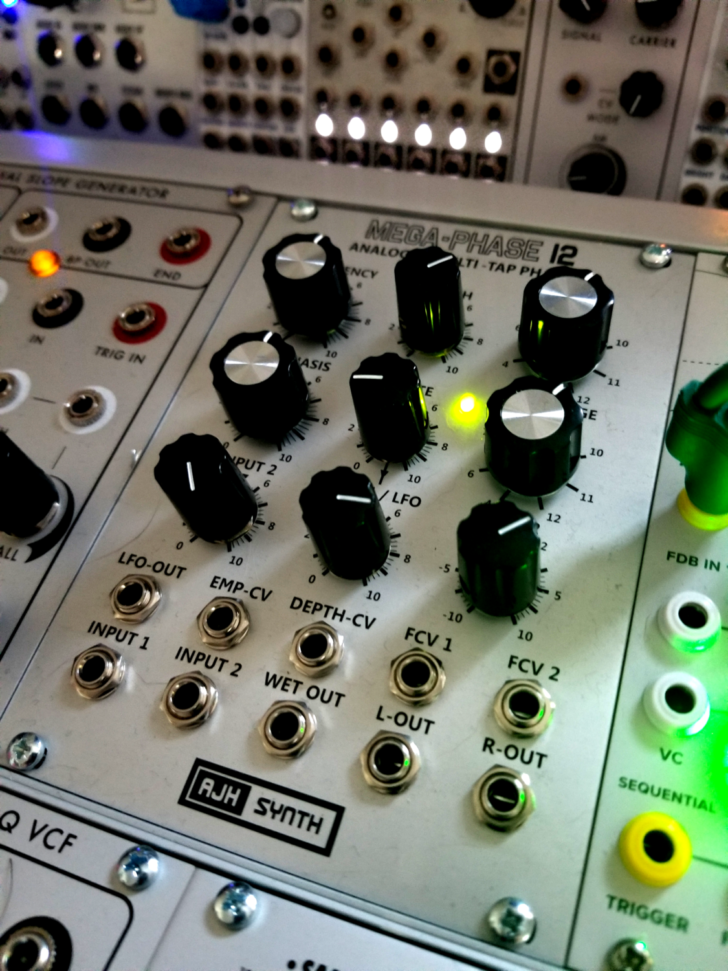
Evan Bartholomew has been performing electronic music for nearly 20 years as Bluetech, Evan Marc and Invisible Allies (with Kilowatts).
Bartholomew has produced dozens of albums and also has a portfolio of video game and film/tv scoring credits.
His new album on Ian Boddy’s DiN label, Liquid Geometries, sees him exploring analog modular soundscapes, with a nod to the Berlin School masters.
In this interview, synthesist Evan Bartholomew tells us about creating his new Bluetech album, Liquid Geometries.

Synthtopia: Evan, before we get into your new album, can you tell us a little about yourself? And how did you get into music?
Evan Bartholomew: I’ve actually been playing music my whole life. I started with piano around age 5, and spent my childhood playing classical music instead of sports.
I guess I’m a bit lucky in that I’ve always known what I wanted to do with my life. I fell in love with Mozart when I was kid, and decided that’s who I wanted to be when I grew up.
Synthtopia: What made you decide you wanted to make electronic music? Were there specific albums or tracks that inspired you?
Evan Bartholomew:
When I first heard electronic music in my teens I thought to myself “This is it, this is the music I hear in my head. This is what I’m here to do.”
I used to get Keyboard magazine in the early 80s and it would come with a printed vinyl record insert. I started hearing these keyboard and synth sounds and was immensely drawn to them. I think I bought the first Orb album on a whim and discovered them, The Shamen, Spacetime Continuum, Irresistible Force – all of these artists around the same time.
I believe it was Option magazine that had a feature on ambient music and the chill out movement, and I searched out every album I could find and fell in love with all of them. Ultramarine, Rising High Records, the Instinct chill out series, Eno/Wobble, Tranquillity Bass – all of that stuff. I would circle every record review in Option that was electronic-oriented and go to the record store with my list and buy any of them that were distributed.
Synthtopia: How did you make the jump to actually composing and releasing your own music, then? Was there a first synth or piece of software that you started with?
Evan Bartholomew: Actually, I started with hardware. My first sequencer was a Roland D-20, but it wasn’t until late teens that I got my hands on a Kurzweil K2000, and from there a Roland MC-505, which I programmed the music on. I think it was a Korg Triton which was my first serious workhorse machine that I did proper sequencing and song creation on.
When I got into computer sequencing it was Digital Performer, then eventually Cubase. For the last 5 years or so I’ve been exclusively using Ableton Live.
Synthtopia: You’ve released several dozen albums under different project names, done tracks for tv and film and you are involved with a VR project. What do you do as ‘Bluetech’, and how does that fit in with your other projects and work?
Evan Bartholomew: At this point I’m singularly focused on Bluetech music, and have moved other things off of the schedule.
I had created different aliases, at one point, to explore different sounds, but my idols are guys like Pete Namlook, Benge, Eno, Youth, etc who just release and produce the music as it comes, regardless of genre.
I figured I can just do what I do and have a go of it in the studio, whether that’s a dub record or a techno record or an ambient modular thing. It’s all me, so might as well just release it all as Bluetech, which is the current strategy. It’s the name that people know my work under, so need to obfuscate and make it challenging for people to find.
I hope its OK that each record is a surprise, based on what my current mood in the studio is!
Synthtopia: Tell us about your new Bluetech album. How would you describe Liquid Geometries?
Evan Bartholomew: I hesitate to throw around the term ‘Berlin School’, but it was at least a jumping off point for me on this particular release.
I was very committed to a sequencer-driven approach and using my modular systems to create this album. Oftentimes, in my head I see my pieces as kinetic sculptures that as they slowly turn reveal new angles (and melodies).
Building slowly off a single sequence and revealing more complex structures was my methodology on this release, so literally I was trying to create fluid geometric forms. I hope I was at least marginally successful in the process. 😉
Synthtopia: I noticed that you are also a visual artist and you did the illustration for the cover of your new album.
Are there specific ideas or themes that you wanted explore with the artwork and music on the new album?
Evan Bartholomew: The artwork was very literal, basically linear analog of the title Liquid Geometries. Its a geometric illustration with liquid elements.
Synthtopia: In your album notes, you included a listing of the the hardware and software you used on Liquid Geometries, which includes Ableton Live and software synths, a Eurorack modular system, 5U modular gear and other hardware synths.
What’s your approach to composing and recording your music?
Evan Bartholomew: I used to write rhythm first, as I read an interview once where Peter Gabriel talked about building a song from the foundation up with rhythm and bass.
These days, I’m much more likely to start with a melody or chord progression or sequence. I usually turn on the modular racks and start patching until something interesting happens. This something may or may not end up in the final composition, but at least it operates as a seed idea that gets things moving.
I am very flow oriented in the studio. I spend a lot of time just listening and wait until the next piece reveals itself. I’m not usually going in with a set idea in mind, it’s very much letting the music itself describe the journey.
I often feel like I’m just notating something that already exists. I find the entry point, and then sit and wait for it to reveal its complexity. I find if I am “thinking” about the music or “trying” to create something, then its usually crap. I find my best work comes when I just get out of the way and let it happen.
Synthtopia: Do you have certain roles that you like to use your various instruments for in your music?

Evan Bartholomew: This often depends on what is new! I’m definitely a gearhead, so love exploring each new piece.
At the moment, its a mint Mono/Poly I got from Japan. I’ve been using this often as a lead voice on works. The EP I just finished is a little nod to electro music, so the 303 takes over the lead duties there.
Synthtopia: Many of your track titles – like Crystalline Forms, Tranquility Gate or Underground Lakes – are very visual. Given that you’re a visual artist, too, I wondered if you have specific imagery in mind as you make music. Do you think of your music having a visual aspect to it?
Evan Bartholomew: Honestly, naming songs is the hardest part for me. Often the names comes after the album has been finished for awhile, and I re-experience the pieces as a listener, instead of being up close with them as the composer. Once I get in deep with them again, I find they evoke certain images in me and that directs the naming experience.
Synthtopia: Evan, thanks for taking the time to tell us a little about yourself and your music. How can readers find out more?
Evan Bartholomew: Liquid Geometries is available now on the excellent DiN label..
My socials are: Bluetechonline, Facebook, Twitter & Instagram.
Liquid Geometries Preview:
Track Listing:
01 Bardo Waves 6:42
02 Vessels 7:34
03 Helix 5:18
04 Crystalline Forms 6:22
05 Subterranea 5:18
06 Dawn Ascent 7:17
07 Tranquility Gate 7:53
08 Resonating Heart 5:42
09 Underground Lakes 6:10
Technical Details:
Eurorack Modular Gear:
Verbos, Intellijel, Random Source Serge, 4ms, Synthesis Technology, WMD, Mutable Instruments, Make Noise, Rossum Electro, Mannequins, Hexinverter, Xaoc, Alright Devices, System 80, Music Thing Modular, ALM, Magpie Modular & Strymon
MU Modular:
Moon Modular, Synthesizers.com, Free State FX, STG Soundlabs & Synthcube
Synths:
Moog Voyager, David Smith Prophet 6 & Korg Arp Odyssey
FX Pedals:
Strymon, Eventide, Empress, Earthquaker Devices & Shift Line
Software:
Ableton Live, Soundtoys & Native Instruments Reaktor
Analogue Systems French Connection & Make Noise O-Coast on Track #7 by: Ian Boddy










Super awesome! The new album is great.
Thanks for sharing this interview! His new album is really good. Like he says in the interview – a little bit of a Berin School feel, but also definitely his own take on it.
Evan Bartholomew: “I hesitate to throw around the term ‘Berlin School’, but it was at least a jumping off point for me on this particular release.
I was very committed to a sequencer-driven approach. ”
Hypnotic, Meditative Berlin School.
Very nice a bit like Klaus Schulze , even finer and better at my taste .
Sonic awesome sauce. Yummy.
great stuff…listing now
Glad to be introduced to the music of Bluetech. Now enjoying a Bluetech album from 2004 that reminds me of Adham Shaikh, one of my favorites from the day.